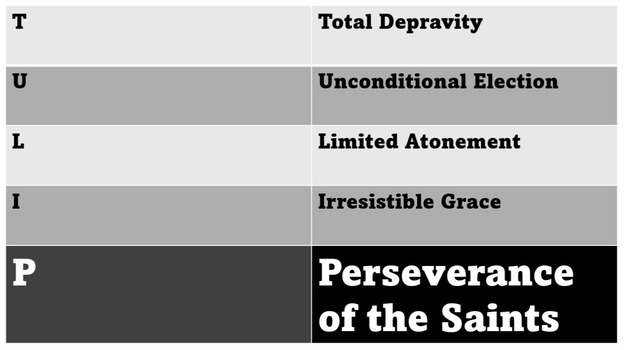Calvinism’s TULIP: Why Affirm Perseverance of the Saints?
Why Affirm Perseverance of the Saints? Welcome to the fifth and final post in our series on TULIP, the five points of Calvinism that form the backbone of Reformed theology. In this series, we’re hoping to make a compelling, biblical case for each of these five doctrines that are often considered difficult yet, are profoundly important. The acronym TULIP stands for:
- T: Total Depravity
- U: Unconditional Election
- L: Limited Atonement
- I: Irresistible Grace
- P: Perseverance of the Saints
Today, we’re focusing on the ‘P’ in TULIP: Perseverance of the Saints. This doctrine has often been misunderstood, leading to both complacency and anxiety among believers. It is therefore necessary for thinking Christians to settle for ourselves this question: is there a compelling enough reason from Scripture that prompts us to affirm the doctrine? Why must we affirm this difficult doctrine? And why is it necessary to grapple with these challenging concepts in our times?
Understanding Perseverance of the Saints
Perseverance of the Saints teaches that those who are truly saved will persevere in faith until the end. This doesn’t mean believers won’t struggle or even temporarily fall into sin, but that God will ultimately preserve them and bring them to final salvation. It’s sometimes summarized as “once saved, always saved,” but this simplification can lead to misunderstandings.
Why Affirm Perseverance of the Saints? Here’s Biblical Support:
Perseverance of the Saints teaches that those who are truly saved will persevere in faith until the end. This doesn’t mean believers won’t struggle or even temporarily fall into sin, but that God will ultimately preserve them and bring them to final salvation. It’s sometimes summarized as “once saved, always saved,” but this simplification can lead to misunderstandings.
Let’s examine some key passages that support this doctrine:
- Philippians 1:6 (ESV): “And I am sure of this, that he who began a good work in you will bring it to completion at the day of Jesus Christ.” Paul expresses confidence that God will finish the work of salvation He started in believers.
- John 10:27-29 (ESV): “My sheep hear my voice, and I know them, and they follow me. I give them eternal life, and they will never perish, and no one will snatch them out of my hand. My Father, who has given them to me, is greater than all, and no one is able to snatch them out of the Father’s hand.” Jesus assures that those who are His will never perish and cannot be snatched from God’s hand.
- Romans 8:29-30 (ESV): “For those whom he foreknew he also predestined to be conformed to the image of his Son, in order that he might be the firstborn among many brothers. And those whom he predestined he also called, and those whom he called he also justified, and those whom he justified he also glorified.” This passage presents an unbroken chain from God’s foreknowledge to our glorification.
- 1 Peter 1:3-5 (ESV): “Blessed be the God and Father of our Lord Jesus Christ! According to his great mercy, he has caused us to be born again to a living hope through the resurrection of Jesus Christ from the dead, to an inheritance that is imperishable, undefiled, and unfading, kept in heaven for you, who by God’s power are being guarded through faith for a salvation ready to be revealed in the last time.” Peter describes our salvation as being guarded by God’s power for a sure future revelation.
Why Affirm Perseverance of the Saints?
- It Glorifies God’s Faithfulness: This doctrine emphasizes that our salvation depends on God’s faithfulness, not our own (2 Timothy 2:13).
- It Provides Assurance: Believers can have confidence in their salvation, knowing it’s secured by God (1 John 5:13).
- It Motivates Holiness: Far from promoting complacency, this doctrine encourages believers to persevere as evidence of true faith (Hebrews 3:14).
- It Aligns with God’s Sovereign Purpose: It ensures that God’s purpose in election and Christ’s work of atonement are ultimately effective (Romans 8:28-30).
- It Emphasizes the New Covenant: It reflects the promise of the new covenant, where God writes His law on our hearts (Jeremiah 31:31-34).
Addressing Common Misunderstandings
- Doesn’t this promote moral laxity? No, true salvation produces good works (Ephesians 2:10). Those who use this doctrine as a license to sin show they may not be truly saved (1 John 3:9).
- What about warnings against falling away? These serve as means God uses to keep His people persevering (Hebrews 3:12-14).
- Can’t people lose their salvation? Those who permanently fall away demonstrate they were never truly saved to begin with (1 John 2:19).
- Doesn’t this contradict human responsibility? God’s preservation and our perseverance work together; we’re called to work out our salvation, knowing it’s God who works in us (Philippians 2:12-13)
Why Affirm Perseverance of the Saints Today?
In our current cultural climate that often emphasizes temporary commitments and shifting loyalties, Perseverance of the Saints reminds us of crucial biblical truths:
- God is faithful, even when we are faithless.
- True faith perseveres through trials and temptations.
- Our eternal security rests in God’s power, not our own strength.
Understanding and affirming this doctrine fosters a deep sense of gratitude, a motivation for holiness, and a confident hope in God’s promises, countering the prevalent notions of casual faith and self-dependent spirituality.
Conclusion: Perseverance of the Saints, while often misunderstood, is a biblical doctrine that magnifies God’s faithfulness and power in salvation. It assures us of God’s ongoing work in our lives and motivates us to live out our faith with confidence and perseverance.
As we grapple with this truth, may we be encouraged by the words of Jude 24-25 (ESV):
“Now to him who is able to keep you from stumbling and to present you blameless before the presence of his glory with great joy, to the only God, our Savior, through Jesus Christ our Lord, be glory, majesty, dominion, and authority, before all time and now and forever. Amen.”
This doctrine leads us not to complacency, but to grateful, joyful, persevering faith, knowing that He who called us is faithful, and He will surely do it (1 Thessalonians 5:
Related FAQs
- Why does the doctrine of Perseverance of the Saints continue to be controversial? Perseverance of the Saints is controversial because it challenges the belief that salvation can be lost through serious sin or apostasy. Critics argue that it may lead to moral laxity by assuring believers of eternal security regardless of their actions. However, supporters believe it reflects God’s faithfulness and the sufficiency of Christ’s work.
- What does Perseverance of the Saints mean? Perseverance of the Saints means that those genuinely saved will continue in their faith until the end. It teaches that God’s grace will preserve believers, ensuring they remain faithful and ultimately reach final salvation. While believers may struggle and even sin, God will never let them fall away completely.
- Why do we affirm Perseverance of the Saints? We affirm this doctrine because it emphasizes God’s sovereignty and faithfulness in securing our salvation. Scriptures like John 10:27-29 and Philippians 1:6 affirm that God protects and keeps His people. This doctrine assures us that our salvation is not based on our strength but on God’s unchanging power.
- Does Perseverance of the Saints mean “once saved, always saved”? While similar, Perseverance of the Saints is more nuanced than the simple phrase “once saved, always saved.” It does not imply that one can live in sin without consequence but asserts that true believers will not ultimately fall away because God will keep them. Genuine faith will produce perseverance and a transformed life.
- How does Perseverance of the Saints relate to human responsibility? Perseverance of the Saints does not negate human responsibility. While God preserves believers, they are also called to actively persevere in faith and obedience. Philippians 2:12-13 shows that believers are to work out their salvation, knowing that it is God who works in them to will and act according to His purpose.
- Does this doctrine promote moral laxity? No, true understanding of Perseverance of the Saints motivates holiness and obedience. The assurance of salvation leads to gratitude, love for God, and a desire to live according to His will. Those who view this doctrine as a license to sin may reveal that they were never truly regenerated.
- What about warnings in Scripture about falling away? Scriptural warnings against falling away serve as a means to keep believers alert and vigilant. These warnings encourage believers to examine their faith and cling to Christ. They are a part of how God ensures the perseverance of His saints, motivating them to continue in faith.
Related Posts
Editor's Pick

Prevenient Grace: 5 Reasons the Doctrine Fails
Can a spiritually dead person choose God? It’s one of the oldest questions in Christian theology. And how we answer [...]

Why Do People Hate the Doctrine of Election?
…WHEN THEY REALLY SHOULDN’T Few Bible doctrines provoke stronger reactions than election. The idea that God chose some for salvation [...]

The Doctrine of Providence: Does God Really Govern All Things?
You’re sitting in the doctor’s office when the diagnosis lands like a thunderclap. Your mind races: Why this? Why now? [...]
SUPPORT US:
Feel the Holy Spirit's gentle nudge to partner with us?
Donate Online:
Account Name: TRUTHS TO DIE FOR FOUNDATION
Account Number: 10243565459
Bank IFSC: IDFB0043391
Bank Name: IDFC FIRST BANK






